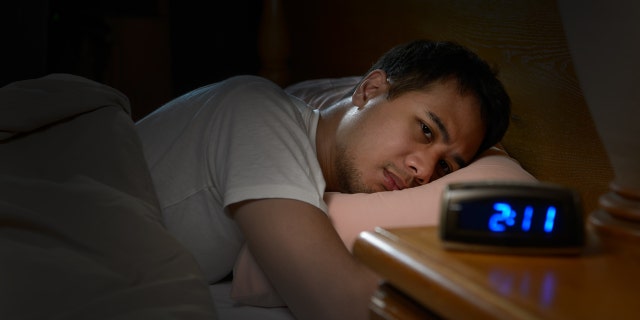
Lounging in bed all day might seem lazy — but some Gen Z trend followers are now embracing it as a form of self-care.
“Bed rotting” — the practice of spending long periods of time snuggled under the covers with snacks, screens and other creature comforts — is gaining popularity on social media.
The unofficial definition, per Urban Dictionary, is “the Gen Z term for staying in bed for days on end, binging on Netflix, Tik Tok and Hinge.”
SINGING WITH OTHERS FOR HEALTH AND WELLNESS: IT CAN ‘RENEW THE SPIRIT AND ADJUST THE MINDSET’
Are these extended siestas really wise for one’s mental health — or could they be a cause for concern?
Fox News Digital reached out to some professionals for their take on this leisurely trend.

“Bed rotting” — the practice of spending long periods of time snuggled under the covers with snacks, screens and other creature comforts — is gaining popularity among some on social media. (iStock)
Dr. Ryan Sultan, a board certified psychiatrist, research professor at Columbia University in New York and medical director of Integrative Psych NYC, who treats many young patients, called the bed rotting trend “fascinating.”
“In our current culture, with too much to do, too many expectations and too much productivity, many individuals are feeling burned out and often aren’t getting enough sleep,” Sultan told Fox News Digital.
SPIKE IN TEEN DEPRESSION ALIGNS WITH RISE OF SOCIAL MEDIA, NEW POLL SUGGESTS: ‘IT’S NOT GOING ANYWHERE’
“It’s easy to see why taking time off to lie around — literally — is appealing,” he went on.
“In many ways, this is beneficial. It’s a chance to clear your mind, recharge and regroup before returning to life in a better frame of mind.”
On the flip side, however, he said a long-term need or desire for “bed rotting” could be a warning sign.
Spending too many daytime hours in bed — awake or not — could also wreak havoc on sleep schedules, one doctor warned.
“If it becomes a habit, it is likely a sign of depression,” Sultan said. “People should be mindful if bed rotting become a pattern of behavior.”
Spending too many daytime hours in bed — awake or not — could also wreak havoc on sleep schedules, the doctor cautioned.
“Our brains are fine-tuned for sleep in darkness and alertness in light,” he explained. “Lying in bed half-asleep during the day will worsen sleep regulation — and once it’s dysregulated, it’s a challenge to fix.”

A long-term need or desire for “bed rotting” could be a warning sign of depression, according to a mental health expert. (iStock)
Dr. Marc Siegel, professor of medicine at NYU Langone Medical Center and a Fox News medical contributor, agreed that while some downtime can be useful in terms of de-stressing and rejuvenation, “prolonged bed rotting is a bad health practice.”
In addition to increasing the risk of depression, decreased motivation and disrupted sleep patterns, the practice can also lead to weight gain from sedentary behavior and binge-eating, the doctor said.
“Prolonged bed rotting is a bad health practice.”
“I am also concerned about the medical risks of prolonged bed rotting, including blood clots, blood pressure issues and obesity,” Siegel added.
“Regular exercise as a form of de-stressing is much healthier.”

Instead of sitting or lounging in bed for extended period, Dr. Marc Siegel of New York recommends regular exercise as a better form of de-stressing. (iStock)
One young person claimed on Reddit that the “bed rotting” phenomenon is actually a mask for depression and loneliness.
“I’m Gen Z myself and I find myself rotting in my bed … a lack of friends and social community has been skyrocketing the trend of bed rotting,” the person wrote.
SURGEON GENERAL RELEASES ADVISORY CALLING FOR IMPROVED SOCIAL CONNECTION
“And it is a real sad shame that I see people calling Gen Z lazy when we are simply misunderstood.”
“Lying in bed half-asleep during the day will worsen sleep regulation.”
Another poster who indulges in the practice claimed that bed rotting actually serves to worsen fatigue.
“I’ve been feeling like I’m bed rotting, too. Just don’t care about anything. Have a lot to do, college coming up, errands to run, medical things to take care of — just don’t care,” the poster wrote.

Spending too many daytime hours in bed — awake or not — could also wreak havoc on sleep schedules, a doctor cautioned. (iStock)
“I try not to bed rot, though, cause the more you lay or sit on your bed it convinces your mind that you’re tired, so you just get more fatigued.”
As with any activity, moderation is key when it comes to holing up in bed, Sultan said.
While the occasional lazy day can be beneficial, too much lounging could have the opposite effect.
CLICK HERE TO SIGN UP FOR OUR HEALTH NEWSLETTER
“My best tip is to not get into the cycle to start with, unless you are sick or have an ailment,” Sultan said.
“If it becomes a habit, that’s a fairly sensitive test for depression.”
CLICK HERE TO GET THE FOX NEWS APP
Those who lack the motivation to get out of bed should try calling or texting a friend or family member for support, identifying a small errand or task to complete, or reaching out to a medical professional for help, according to Mental Health America’s website.

 Latest Breaking News Online News Portal
Latest Breaking News Online News Portal




